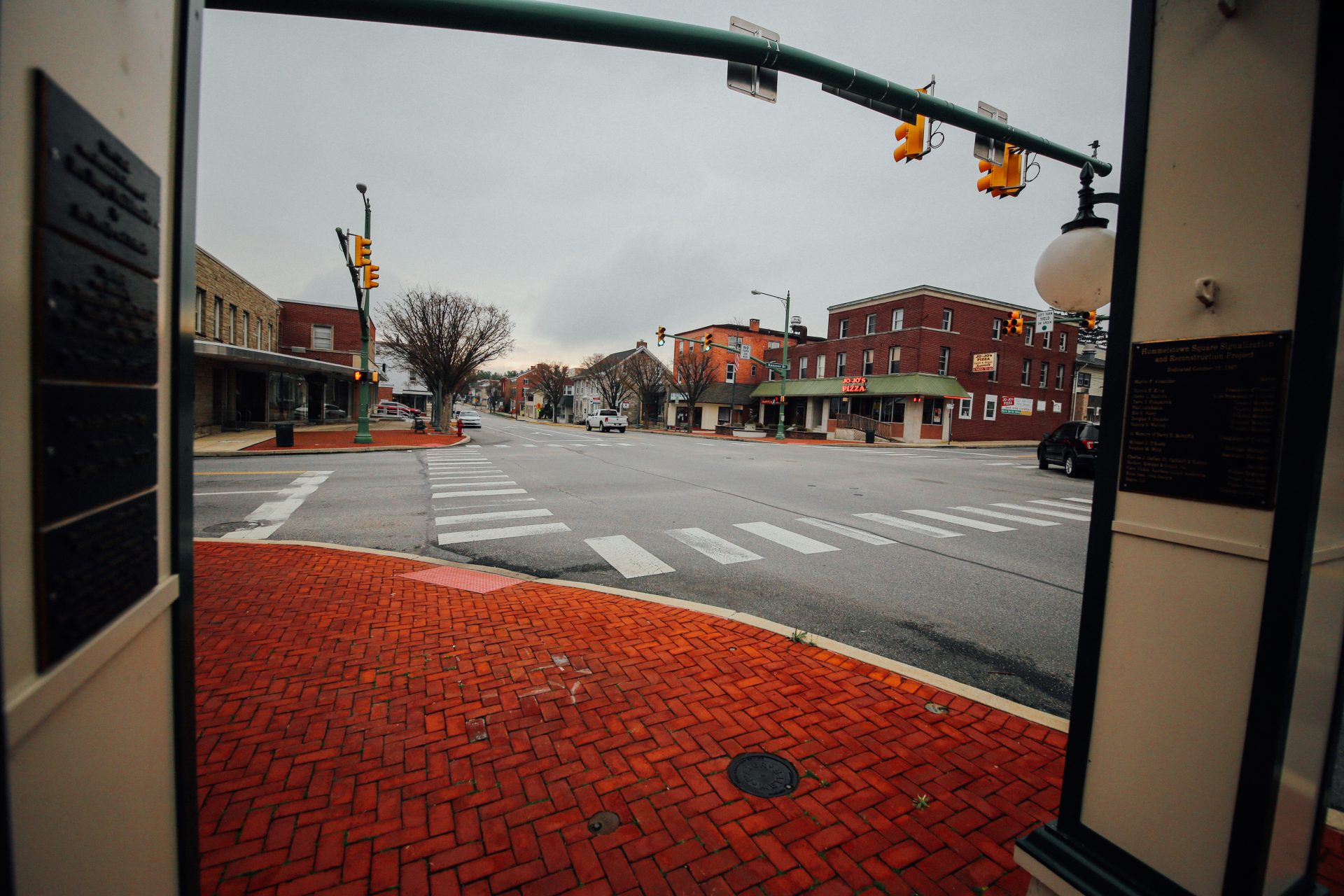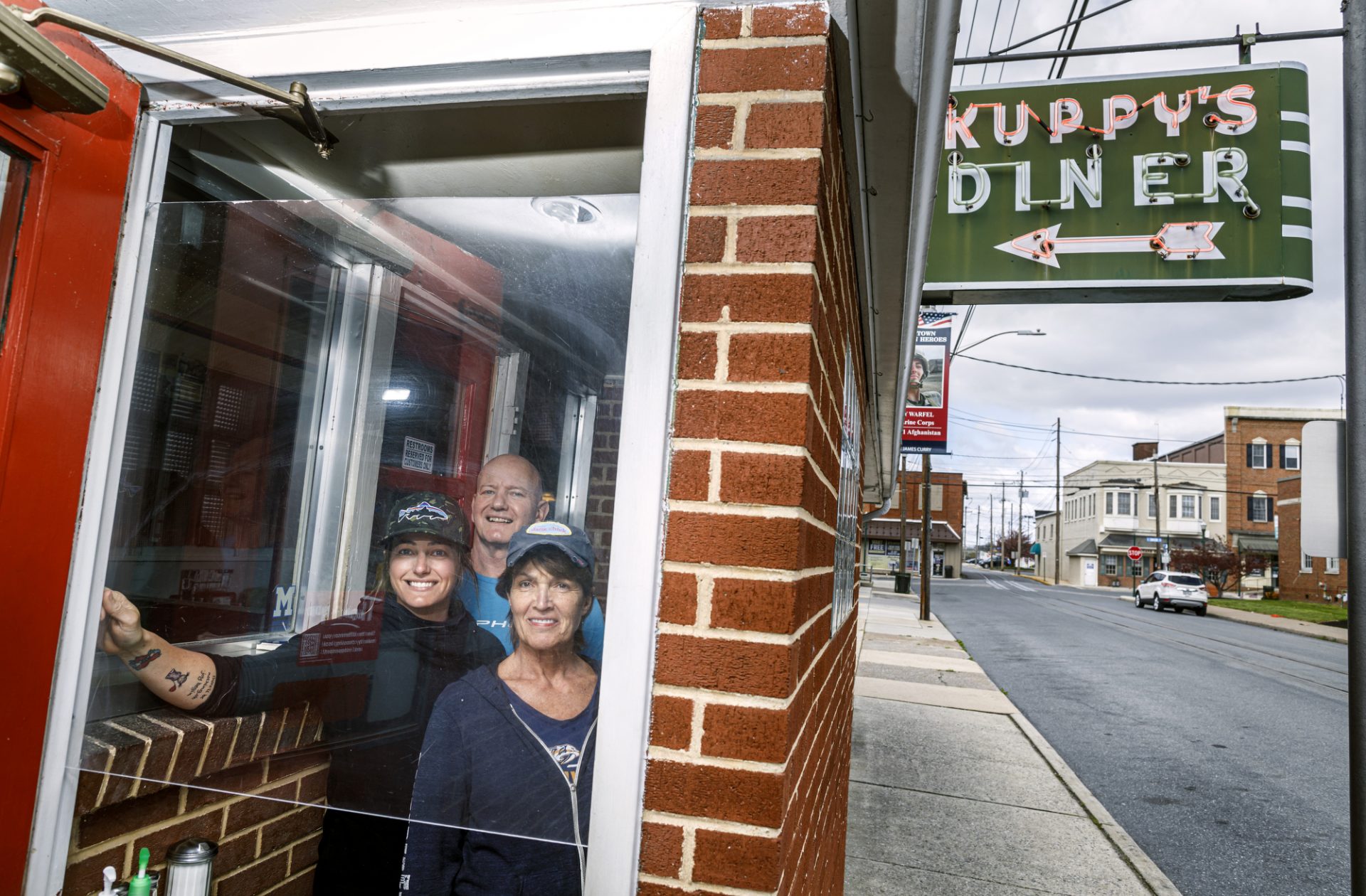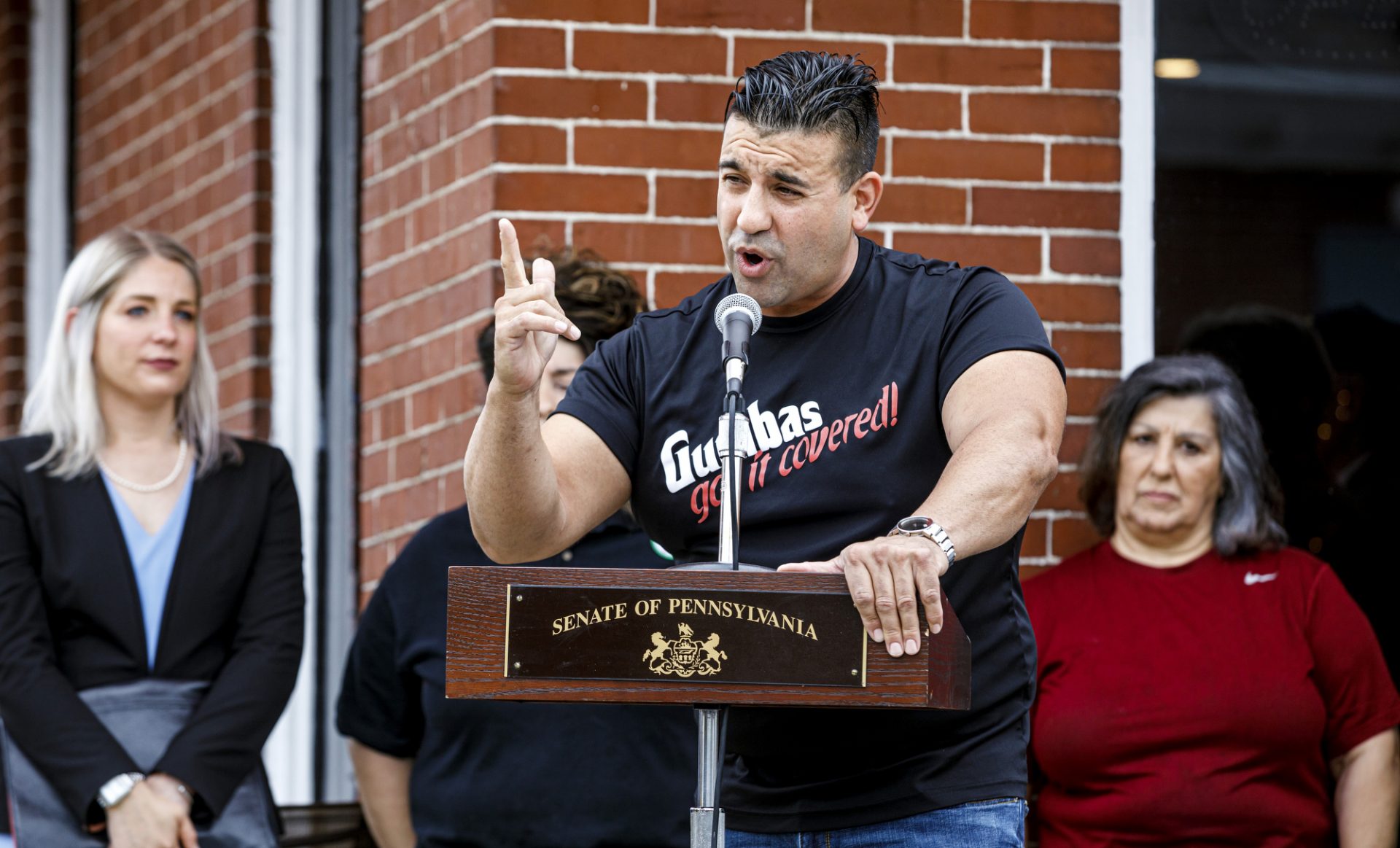
Closed signs are on the front door of Isaac's Restaurant in Hummelstown. April 1, 2020.
Tim Lambert / WITF

Closed signs are on the front door of Isaac's Restaurant in Hummelstown. April 1, 2020.
Tim Lambert / WITF

Tim Lambert / WITF
Closed signs are on the front door of Isaac's Restaurant in Hummelstown. April 1, 2020.
(Hampden Township) — At Black N Bleu, restaurateur Donny Brown did his best to put on a brave face for his 46 employees even as Gov. Tom Wolf’s ban on indoor dining presents yet another existential threat.
“I’m trying to settle them down; just give me a little time to digest this,” Brown said Thursday. “But there’s going to be a loss of jobs.”
The 30-year veteran of the hospitality business added: “As stressed out and tired as I am, I’m beginning to wonder if I’m too old for this.”
It’s a sentiment shared by many across Pennsylvania.
“I can’t afford to pay my staff to sit at home and wait this out.”
— Adam Sturges, owner of McGrath’s and the Sturges Speakeasy
Bars and restaurants hobbled by last spring’s COVID-19 shutdown and the ongoing loss of clientele will lay off thousands of people two weeks before Christmas during what would normally be their most lucrative season.
“Restaurants use December to get through January and February,” said John Longstreet, president of the Pennsylvania Restaurant & Lodging Association. “Now they have no December.”
The trade association just completed a survey in which 45% of its membership said they were unlikely to still be in business in six months if conditions didn’t change.
“They changed,” Longstreet said, “and they changed for the worse.”
Based on that survey completed earlier this month, Longstreet believes as many as 13,000 businesses could close in the wake of the indoor dining ban, which takes effect Saturday and continues through at least Jan. 4. Worst hit will be “ma and pa restaurants,” he said, since the major chains have the financial wherewithal and national footprint to survive a local downturn.
The economic hit, however, will ripple outward as thousands of workers are laid off, downtown storefronts shutter and lenders withdraw support from upstart restaurants.
“When downtown Harrisburg began a resurgence, it started when restaurants opened downtown,” Longstreet said. “Same with Lancaster, Bethlehem, Allentown, Erie… the consequence of this is we start to lose downtowns.”
Harrisburg, which enjoyed a vibrant nightlife scene since the ’90s, already saw a wave of closures even as local restaurateurs shifted to outdoor dining and take-out.
Adam Sturges, who owns McGrath’s and the Sturges Speakeasy, said he expects to lay off a third of his staff — some 20 people — and cut the hours of many who remain. On Thursday, he was already at work on a new holiday catering menu in the hope that curbside pickup will help stem the losses.
“I’m concerned for my staff,” he said. “As much as I’ve been preparing and planning for the chance of this happening again, I can’t afford to pay my staff to sit at home and wait this out.”
Earlier in the pandemic, Qui Qui Musarra expanded outdoor dining and essentially consolidated her three North Street establishments — Mangia Qui, Rubicon and Suba — into one.
“I suppose it’s what’s best for all,” she said. “It’s hurt the industry immeasurably but as long as we can keep going with takeout and delivery, there’s a little glimmer of hope there.”
Like many hospitality veterans, she’s trying to put on a brave face.
The upside for smaller restaurants, Musarra said, is that the statewide ban levels the playing field.
“Since it’s a blanket maneuver across all the restaurants, it might improve dining in the sense that everyone has to do delivery and take out,” she said. “Smaller restaurants may only be able to seat six people at 25 percent [capacity].”

Tim Lambert / WITF
Empty streets in downtown Hummelstown in Dauphin County on April 1, 2020.
Across the river in Camp Hill, Norm Fromm of Ever Grain and Brewhouse doesn’t see much upside. On Monday, his 2,000-square-foot restaurant had just 10 customers. Come Saturday, there won’t be any.
“Our building’s too big; it’s not built for to-go,” he said. “We have heat, electric, gas, taxes, water… We were barely making it as it was before with 50 percent capacity.”
Fromm said he feels the restaurant business is being unfairly targeted for these measures. When he stops at a gas station for his morning coffee, he can’t help but notice that the touch screens aren’t wiped down after each customer.
Now, Fromm said he’s contemplating the end of his 30-year career, which will also mean pink slips for 50 employees.
“I had 10 people in my place Monday and you’re telling me that’s the problem?” He said. “That’s not the problem. I don’t want anybody getting hurt, obviously, but my problem is shutting down when other businesses stay open.”
Longstreet, of the trade association, said the Wolf administration had sought its input prior to announcing the indoor dining ban. The PRLA had implored officials to let establishments continue operating through the end of the year and, barring that, to give them plenty of advance notice.
Neither of those things happened.
“Tomorrow, these people are out of work with no way to make money,” he said. “Restaurants full of food will rot in the cooler or, with any luck, be given to food banks.”
The association had hoped for more interim steps, Longstreet said, such as stricter occupancy limits or requirements that diners wear face masks.Of course, there is another path that none of the restaurateurs PennLive spoke to are considering and the PRLA itself is specifically advising its members not to follow: Ignore the mandate.
Taste of Sicily in Palmyra, within an hour of Wolf’s announcement, issued an all-caps retort via Facebook: “I HAVE HAD TONS OF PHONE CALLS AND EMAILS. YES… TASTE OF SICILY IS STAYING OPEN!!!!!!!!”
Kuppy’s Diner in Middletown followed suit: “The only day we will be closed is Christmas Day.”

Dan Gleiter / PennLive
FILE PHOTO: Kuppy’s Diner on Brown Street in Middletown, pictured in April, announced plans to defy Gov. Tom Wolf’s indoor dining ban.
Mike Mangano, who owns Taste of Sicily, said in an interview Thursday the family business follows all of the regulations for safe food handling and sanitation. But the governor’s orders — which Taste of Sicily violated in the spring, as well — would put his restaurant out of business.
“We don’t care what the governor says or does,” Mangano said. “We already got $10,000 in fines. We might as well rack up some more.”
If any of Taste of Sicily’s patrons fell ill, Mangano said he would feel bad. Ultimately, he said, anyone who comes to the restaurant knows how it operates.
“Every free thinking, freedom-loving American has the right to patronize Taste of Sicily or they don’t have to patronize Taste of Sicily,” he said. “With that said, whoever comes through the door, we’re going to serve them.”

Dan Gleiter / PennLive
FILE PHOTO: Mike Mangano speaks. Elected officials and community members gather at a protest on June 5, 2020, in support of Taste of Sicily, a Palmyra-based restaurant that’s been allowing customers to have sit-down meals in violation of Gov. Tom Wolf’s reopening plan.
While he can’t condone violating the law, Longstreet said he does understand where the impulse is coming from.
“They’ve asked them to do something unreasonable; they’ve asked them to give up their livelihood,” he said. “People get desperate when you put them in desperate conditions.”
For his part, Gov. Tom Wolf struck an empathetic tone during the announcement on Thursday.
“[The virus] spreads most easily when people are spending time together,” he said. “These are the same conditions we find in restaurants and bars. It’s not the fault of the restaurant owner . . . it’s just the nature of the disease.”
Wolf called upon both the state Legislature and Congress to approve additional stimulus funds to prop up the struggling hospitality industry. So far, however, measures in both venues have faltered.
Earlier this month, the GOP-led Legislature passed and Wolf signed a state budget that used $1.3 billion in federal aid to paper over its own deficit.
Senate Majority Leader Mitch McConnell, a Republican, rejected a federal COVID-19 relief package on Thursday that had bipartisan support.
In the meantime, local restaurants and their beleaguered staff look to the future with a mix of anxiety, resignation and a wild, resilient hope.
“With a vaccine on the way, I can see daylight,” Brown, at his aptly named Black N Bleu Restaurant, said. “I like what I do. I don’t want to close. My only thing in my head right now is: Play the hand you’re dealt.”
The days of journalism’s one-way street of simply producing stories for the public have long been over. Now, it’s time to find better ways to interact with you and ensure we meet your high standards of what a credible media organization should be.